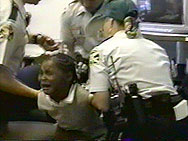An Open Question for Constitutionalist Liberals
Here’s a typical, arbitrarily selected attempt by mainstream liberals to explain what’s wrong with the Bush administration’s enthusiastic support undisclosed, unchecked, and unaccountable domestic spying. This comes from Hilzoy at Political Animal (2005-12-18):
What George Bush has done, by signing his Presidential Order, is to produce exactly that accumulation of powers that Madison and the other framers of the Constitution were determined to prevent. He has decided to circumvent the courts’ power to decide whether the government has enough evidence to place someone under surveillance, thereby removing a crucial check on executive power, and arrogating one of the powers of the judiciary to himself.
Moreover, the power he seeks to strip the judiciary of is not a peripheral one; it is essential to the Fourth Amendment prohibition against unreasonable searches and seizures. …
In addition, in deciding that he has the right to disregard clear statutes, President Bush is arrogating to himself the power of the legislature as well. The Legislature has the power to make laws; the Executive carries out the laws the Legislature has written. Had George W. Bush wanted to, he could have gone to Congress and asked it to change the laws. Instead, he decided to simply ignore them: to act as though he had the powers that the Constitution reserves to the legislative branch.
He is, essentially, claiming that he has the right not just to execute the laws, but to write them himself, and then to judge their application. …
But if it’s hard to reconcile the administration’s position with the Constitution and the views of the framers, it’s even harder to reconcile it with anything remotely resembling common sense. Because, on this view, the President can do anything he wants — anything at all — during wartime. …
In this country we do not have an absolute monarch. We have a President who is bound by the rule of law, just like the rest of us. When he asserts the right to set the laws and the Constitution aside, and to arrogate all the powers of government in his hands in secret so that he can use it unchecked, we have an obligation to make it clear that he is wrong.
Now, to be clear, I think that the Right’s legal brief on behalf of the Bush administration is both specious and frankly dishonest; they’re wrong, and Hilzoy is right, about the question of positive law. But here’s the open question. There are actually two separate, or separable, objections that Hilzoy is lodging against the use of undisclosed, unchecked, and unaccountable domestic spying on in these passages. Specifically, Hilzoy is objecting both that
Bush has to claim the authority to disregard existing laws and the Constitution in order to justify undisclosed, unchecked, and unaccountable domestic spying (i.e., he’s operating outside of the standing law); and also
engaging in undisclosed, unchecked, and unaccountable domestic spying, in and of itself, involves arrogating all the powers of government into his hands (i.e., he’s diminishing the separation of powers, and thus claiming the right to more power than one person should have).
It should be clear that these two objections are separable. The Constitution didn’t have to be written with provisions for the separation of powers, and the Constitution and the laws can always be changed. If, for example, Bush had gotten Congress to repeal FISA, and, while he was at it, had gotten Congress and the several states to amend the Constitution to repeal or limit the Fourth Amendment, then he wouldn’t be vulnerable to objection 1, but objection 2 would not be affected.
Now, here’s the open question. If Bush had gotten the law and the Constitution changed so as to authorize undisclosed, unchecked, and unaccountable domestic spying, would that have made it O.K.? Would it have even made it substantially less bad?
If it would have, then why would it have? If it wouldn’t have, then why spend so much time and energy stressing the fact that he did tread on the statutory law and the Constitution, if you don’t think that that makes a substantial difference?
 We already knew that
We already knew that  A lawyer has threatened to sue police officers who handcuffed an
allegedly uncontrollable five-year-old after she acted up at a
Florida kindergarten.
A lawyer has threatened to sue police officers who handcuffed an
allegedly uncontrollable five-year-old after she acted up at a
Florida kindergarten.


